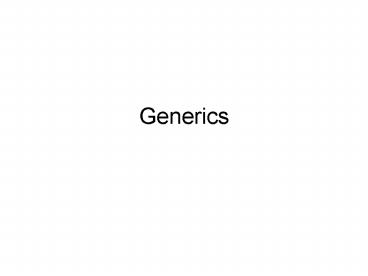Generics - PowerPoint PPT Presentation
1 / 17
Title:
Generics
Description:
Title: PowerPoint Presentation Last modified by: davise Created Date: 1/1/1601 12:00:00 AM Document presentation format: On-screen Show Other titles – PowerPoint PPT presentation
Number of Views:33
Avg rating:3.0/5.0
Title: Generics
1
Generics
2
Type parameters
- The definition of ArrayApplier in applier.java
and applier2.java allows any function from int to
int. But suppose you want to write a single
array applier for any function from type T1 to
T2? - Dynamic method binding allows the type of self
to be variable, but theres no way to get 2
variable types.
3
Generics in Ada
- Essentially a structured macro.
- generic
- type Item is private
- type ItemArray is array (Integer range ltgt) of
Item - with function f(X Item) return Item
- procedure
- ArrayApplier(A,B in out ItemArray)
- begin for I in 1 .. ALast loop
- BI f(AI)
- end loop
- end
4
Instantiating an Ada generic
- function incr(I Integer) return Integer is begin
return I1 end - type IntArray is array(Integer rangeltgt) of
Integer - function ApplyIncr is new ArrayApplier(Integer,Int
Array,incr)
5
Implementation
- Each instantiation of the generic is built by a
preprocessor at compile time, and compiles to a
separate routine. - Like a macro.
6
C templates
- template lttypename Tgt
- int compare(const T v1, const T v2)
- if (v1 lt v2) return -1
- if (v2 lt v1) return 1
- return 0
- int I,J compare(I,J) // int compare
- double X,Y compare(X,Y) // double compare
- compare(I,X) // compiler
error
7
Java generics example
- interface UnaryFunltT,Sgt
- public S f(T x)
- class IntSqrt implements UnaryFunltInteger,Floatgt
- public Float f(Integer i)
- return new Float(Math.sqrt(i))
8
Example continued
- class ApplierltT,Sgt
- public void ApplyToArray(
- UnaryFunltT,Sgt Q, T A, S B)
- for (int i0 i lt A.length i)
- Bi Q.f(Ai)
9
Example continued
- main
- Integer A new Integer 1,2,3
- Integer C new Integer3
- IntSqrt ISQ new IntSqrt()
- ApplierltInteger,Floatgt IFApp
- new ApplierltInteger,Floatgt()
- IFApp.ApplyToArray(ISQ,A,C)
10
Generic types
- LinkedList list new LinkedList()
- list.add(new Integer(1))
- Integer num (Integer) list.get(0)
- LinkedListltIntegergt L
- new LinkedListltIntegergt()
- L.add(new Integer(1))
- Integer num list.get(0)
11
Subtypes of generic types
- LinkedListltIntegergt LI new LinkedListltIntegergt()
- LinkedListltObjectgt LO LI // Type error!
- LO.add(new String(Hello))
- Difference between extensional and abstraction
view of types. - Therefore if a method has a parameter of type
LinkedListltObjectgt you cant pass an argument of
type LinkedListltIntegergt
12
Wildcards
- void printCollection(Collectionlt?gt c)
- for (Object e c) System.out.println(e)
- LinkedListltIntegergt L
- printCollection(L)
13
Restricted type parameters and wildcards
- ltT extends shapegt, ltT super shapegt
- lt? extends shapegt, lt? super shapegt
- void drawAll(Listlt? extends shapegt L)
- for (shape S L) draw(S)
- Type definition for max(c) (simplified)
- public static
- ltT extends Comparablelt? super Tgtgt
- T max(CollectionltTgt coll)
14
Embedded Type Parametrization
- LinkedListltLinkedListltIntegergtgt
- static ListltListlt? extends Shapegtgt history
new ArrayListltListlt? extends Shapegtgt - public void
- drawAll(Listlt? extends Shapegt shapes)
- history.addLast(shapes)
- for (Shape s shapes) s.draw(this)
15
Implementation Type erasure
- No record of the parameter value at run time.
- If L is of type LinkedListltIntegergt, all the
interpreter knows at runtime is that it is of
type LinkedList. - One subroutine for ApplyToArray, not a separate
routine for each different argument type (as in
Ada and C). - Possible because parameters are reference types
and all the same size.
16
Bug, not a feature
- Done for compatibility with legacy code.
- In complex cases, leads to need for casts,
runtime type checking, type unsafe code.
17
Morals
- Backward compatibility is the source of much
grief. - (Forward compatibility is a myth.)
- It is challenging to develop a type theory of
complex entities (collections, functions, etc.)
that is both adequate and well-defined.































